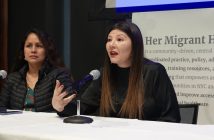Kicking off the intensive four-week International Diploma in Humanitarian Assistance (IDHA) program at Fordham University, Academy Award winner Vanessa Redgrave reflected on her many years of human rights activism and noted how nurturing the soul and spirit are as fundamental as food and funding in providing humanitarian assistance. �What happens to the spirit is just as important as food,� said Redgrave, who addressed the audience in Fordham Law School�s McNally Amphitheater on June 2. �What often gets forgotten is the soul and the soul is involved in many things.� Redgrave recalled how she left drama school in 1956, feeling that she could no longer sit idly by and watch the human rights atrocities caused by the Hungarian revolution.
She volunteered her time by sorting clothes and listening to the downtrodden refugees in London. Although she could not speak nor understand their language, she said providing them with her attention, heart and hand often made all the difference. The IDHA program trains humanitarian aid workers in crisis negotiation, international human rights law, and health and human service issues. Many IDHA students work for relief organizations like the Red Cross, and more than 400 of the program�s graduates hold leading positions in humanitarian operations around the world. The program is a joint effort of Fordham, the Center for International Health and Cooperation, the University of Geneva�s Multifaculty Program in Humanitarian Action and the Royal College of Surgeons. Over the years, Redgrave has traveled to several war-torn countries, including Kosovo and Somalia, and has volunteered her time and advocacy to numerous human rights causes.
She said experience has taught her that fundamental acts of seeing and listening can promote better understanding of complex situations and often point the way to more appropriate remedies. Redgrave�s remarks were joined by a videotaped introduction by the United Nations Secretary General Kofi Annan, who welcomed the students and emphasized the importance of their academic and practical training as they face humanitarian challenges in the future. Throughout the monthlong course, students will have the opportunity to meet and interact with top-ranking U.N. and Red Cross officials as well as leading political, diplomatic and academic officials. Anwarul K. Chowdhury, an Under Secretary General and High Representative at the U.N., also addressed the students, telling them about current trends in humanitarian assistance.
He noted that since there has been no increase in humanitarian aid in recent years, resources have simply been diverted from smaller crises to handle larger emergencies. Chowdhury emphasized the importance of developing a tracking system that would offer a more comprehensive picture of world-wide humanitarian needs. He also noted that all aid should emphasize proactive measures, such as prevention and preparation.


